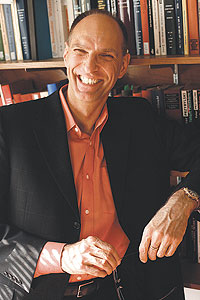Andreas Glaeser, Associate Professor in Sociology and the College
By William Harmsw-harms@uchicago.edu
News Office
 Photo by Beth Rooney Andreas Glaeser | |
For Andreas Glaeser, teaching College students about the broader issues raised in social theory provides the perfect counterpoint to the rewards he finds in his own ethnographic work, which is focused much more on pursuing detailed information about specific subjects.
“We look at the big questions in social theory: What is society? What is history? It’s a pure joy for me as I get a perspective that is like being 30,000 feet in the air, looking down,” said Glaeser, Associate Professor in Sociology and the College, whose current research focuses on how people come to oppose or support authoritarian government.
For his classes, Glaeser has students read the classic and contemporary works of social theorists such as Thomas Hobbes, Karl Marx, Max Weber and Pierre Bourdieu.
In order to have his students gain a better understanding of the works, he has them create examples that help illuminate the authors’ insights. “I want them to be able to translate abstract theoretical concepts into a real-life situation as it might plausibly happen on the ground,” he said. “I have them write lots of small papers to help get them thinking.”
To make the theories more engaging for his students, Glaeser uses his examinations as a means of determining the connections between social theory and real events. For take-home examinations, Glaeser provides data for the students to analyze using the theories they have learned.
“One question which is always important in teaching social theory is to tease out the models of social change and history the authors are working with. So, last year’s theory midterm provided students with a descriptive, statistics-driven report about the transformation of the American family over the last 50 years,” he said. He asked the students to analyze the data based on the theories of Marx and Weber, while remaining critical about the theories, in light of the data, and of the data, in light of the theories.
In a Core class tracing the social formation of the self, with readings by Sigmund Freud, Margaret Mead and Lev Vygotsky, Glaeser used the example of a human rights report about the Muslim-Hindu violence in Gujarat, India, in 2002. “Together with historical information, articles about current electoral politics in Gujarat, I had students think through the question of why conflicts become violent while also taking a particular form, such as genital dismembering and burning people alive,” he said.
Glaeser, a native of Germany, has done extensive ethnographic research in Berlin to understand the impact of reunification on the country. He is the author of Divided in Unity: Identity, Germany and the Berlin Police (2000).
“Because Berlin had been divided, municipal services had to be merged after reunification. This gave me a perfect way to study how unification worked. Police patrols were set up to include one policeman from the western part of the city and one from the east. I followed them as they responded to calls and watched how each responded,” he said.
Glaeser, a faculty member since 1998, has since become a student of socialism, and especially the secret police and the opposition in the former East Germany. “I use examples all the time from my work in my classes,” he said. He draws on his study of the police, as well as his work on the fall of socialism in East Germany—for example, to illustrate the symbolic character of policing or the frequent unpredictability of catastrophic institutional failures.
![[Chronicle]](/images/sidebar_header_oct06.gif)